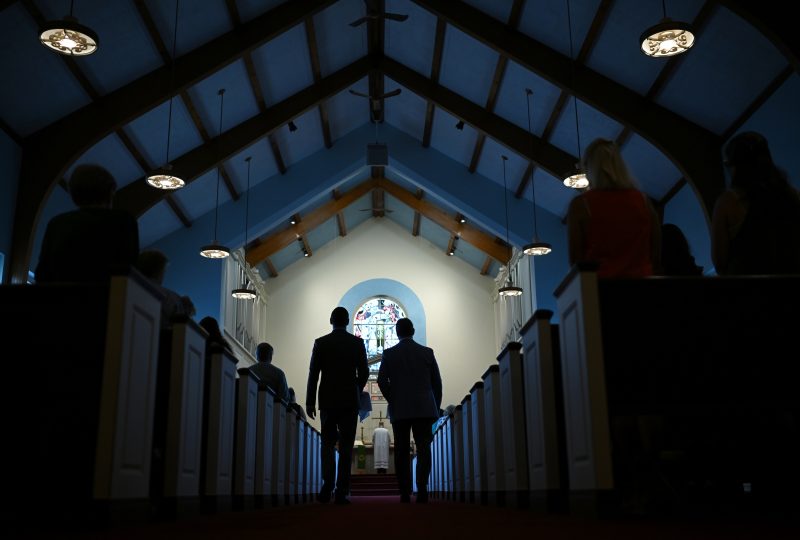At a conservative evangelical church in Visalia, a farming community in the central valley of California, the pastor’s sermon Sunday included a reminder that trumpets sounded a warning to Christians when judgment was coming.
The gunshots fired at Donald Trump on Saturday, according to the Rev. Joel Renkema, were also a trumpet blare, a “clear and quite obvious warning to our country.” Political discourse had gotten out of control, he told parishioners at Visalia Christian Reformed Church, and it was time to stop “hating and demonizing our opponents.”
“This is a warning shot!” Renkema boomed. “Can we hear it? Will we listen?”
By the time worshipers assembled for services across the country Sunday, not even 24 hours had passed since a suspected assassination attempt on Donald Trump at a rally in Butler, Pa. — almost no time for church leaders to figure out how best to guide their shocked congregations through a bloody moment in U.S. history.
Trump, never one to display religiosity, had emerged even before Saturday’s shooting as a messiah-like figure to many hard-right Christians who form the backbone of his MAGA movement. With Trump positioned as a symbol of the faith, an attack on him was cast by some supporters as an attack on Christianity. At a moment of intense division in America, that potentially explosive track led many church leaders — with some notable exceptions — to issue urgent appeals for calm Sunday.
“As Americans, we all have to be horrified today at what took place not too far from here in Butler last evening,” said the Rev. Kris Stubna in remarks Sunday at St. Paul Cathedral, a Catholic parish in Pittsburgh.
“We’re far better than what we saw,” Stubna added. “We condemn what happened to President Trump and will never, ever accept the use of violence for any reason at all.”
The Trump campaign gave no indication that the former president attended church Sunday, though a person who spoke to him said he was almost “spiritual” about the near miss assassination attempt and felt as thought he was “handed a gift from God” by surviving.
Given the mosaic of Christian communities, responses at the pulpit and in the pews varied widely according to location, denomination and demographics. But many drew on similar biblical teachings urging peace and healing — scripture that repeatedly has guided believers in the aftermath of hate-fueled killings and political unrest in recent years.
Some evangelical leaders made pointed allusions to “enemies” and “tests” of the faithful without specifically mentioning Trump or the attack. Others, especially affiliates of the fast-growing Christian supremacist subset known as the New Apostolic Reformation, mentioned Trump by name in sermons and declared spiritual warfare against his opponents.
Joel Osteen, the celebrity preacher with millions of followers, exuded a positive, hopeful energy from his Houston megachurch, which experienced a deadly shooting on-site earlier this year and is now involved in hurricane relief efforts after a storm battered the city.
Osteen’s sermon, streamed live online and on SiriusXM radio, stayed away from direct mention of politics and instead urged Christians going through hardships to look forward to “fresh vision, fresh anointing, fresh favor.”
“We believe the best is still yet to come, that 2024 won’t be a ‘get-by’ year, but a favor-filled, productive, blessed, prosperous year where we see your goodness in new ways,” Osteen told the crowds packed into his cavernous Lakewood Church. “We are victors and never victims.”
There was a decidedly darker tone at a church in neighboring Oklahoma, where Tulsa-based Jackson Lahmeyer, founder of the national group Pastors for Trump, made the sermon topic clear in the name of the live stream: “Trump Assassination Attempt.”
Lahmeyer told congregants at his Sheridan Church that “yesterday we experienced a tragedy, yet a miracle,” alluding to the death of a bystander, Corey Comperatore, and the near miss for Trump. Lahmeyer displayed the viral image of the former president with a bloodied face and a defiant fist in the air. Worshipers erupted in cheers.
“Right now I know many are struggling with the emotional roller coaster — we’re angry, we’re scared, we’re glad,” Lahmeyer said. “And what I want you to know is: We are in a war, and it is a spiritual war. That if we do not win this spiritual war, it will turn into a very physical one.”
Lahmeyer stressed that he wanted to avoid civil war and that differences weren’t between Republicans and Democrats. But in the same sermon, he alluded to “wicked” people who hold on to power and claimed to the audience that evangelicals are “the largest voting bloc in the United States.”
“We are in a war that is between good and evil, period,” he said. “There is no neutrality and we must choose a side.”
For decades, White evangelicals have embraced the idea that they are victims of a hostile culture. Since 2016, they have voted overwhelmingly for Trump, viewing him as a bulwark against liberal values they see as eroding the “Christian identity” of the nation.
A fall poll by the firm PRRI found that White evangelical Protestants are the most likely among faith groups to say the country has gotten “so far off track that true patriots may need to resort to violence in order to save our country,” with more than 3 in 10 White evangelicals agreeing.
“We pray you’d shake this nation to righteousness. Lord, it’s evident we’re in our last few moments,” preached Jack Hibbs of Calvary Chapel, an evangelical megachurch in Chino Hills, Calif.,. “We’re gasping for breath as a nation.”
The Rev. Patricia Phaneuf Alexander, rector of St. Dunstan’s Episcopal Church in Bethesda, Md., cited the Episcopal prayer, written for the days after the Jan. 6, 2021 attack on the U.S. Capitol, asking God to “transform our rage and hate.”
She also invoked President Barack Obama’s words in 2011 after the Arizona shooting that injured then-Rep. Gabby Giffords. “In the week ahead, I challenge us all — myself very much included — to take yesterday’s tragic events and today’s Gospel to prayer,” Alexander told congregants. “Take them to Jesus. And then listen to what Jesus has to say. Align ourselves with the way of love.”
Trump’s political opponents also prayed for him, as in the sermon Sen. Raphael G. Warnock (D-Ga.) delivered Sunday from the pulpit of the historic Ebenezer Baptist Church in Atlanta, located just steps from the gravesite of the Rev. Martin Luther King Jr.
Warnock, the church’s senior pastor, opened with a fierce condemnation of the assassination attempt on Trump and the “coarsening rhetoric of political violence” that he described as a threat to all Americans.
The man who tried to kill Trump “was no patriot,” he said. “And neither were the people who attacked our Capitol and assaulted police officers and tried to stop the nonviolent transfer of political power on January 6.”
“They are cut from the same cloth,” Warnock added. “We must cry foul, we must call out the hypocrisy of anybody who would try to condone one and condemn the other.”
At one point, Warnock said he was thankful that Trump had survived the attack with only minor injuries.
“We pray for him,” he announced to the mostly Black congregants, who offered a muted reaction.
“I said, ‘We PRAY for him,’” Warnock repeated, a little more sternly.
The audience erupted in enthusiastic applause. “Amen!” someone shouted.

